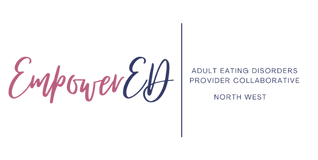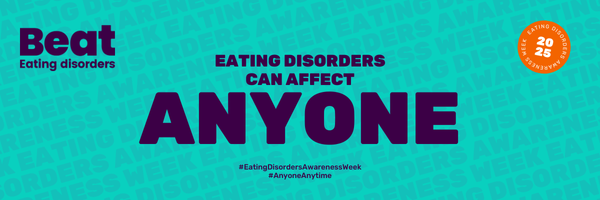This year’s theme for Eating Disorders Awareness Week 2025 is ‘Eating Disorders can affect anyone’.
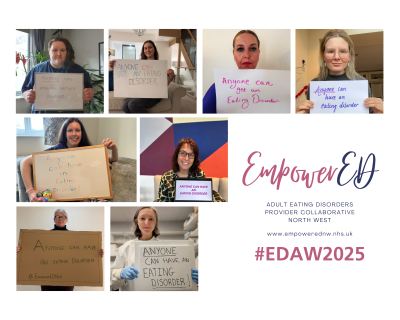
Every year, during Eating Disorders Awareness Week BEAT Eating Disorders, the nationwide organisation supporting people affected by eating disorders, raise awareness of these complex mental health conditions.
Right now, at least 1.25 million people in the UK are living with an eating disorder. That’s more than 1 in 50 people – but the real number could be even higher. Eating disorders like ARFID, anorexia, bulimia, binge eating disorder and OSFED are complex mental health conditions which are often misunderstood, mislabelled or undiagnosed which can prevent people from reaching out for help.
Eating disorders don’t just affect the person with the condition, friends and family often become carers – feeling helpless and heartbroken, as they watch their loved one struggle. Eating disorders are one of the biggest mental health challenges of our time and they can affect anyone at any time.
If you would like to support this campaign and help raise awareness please visit the BEAT website for resources and information.
EmpowerED Experts by Experience
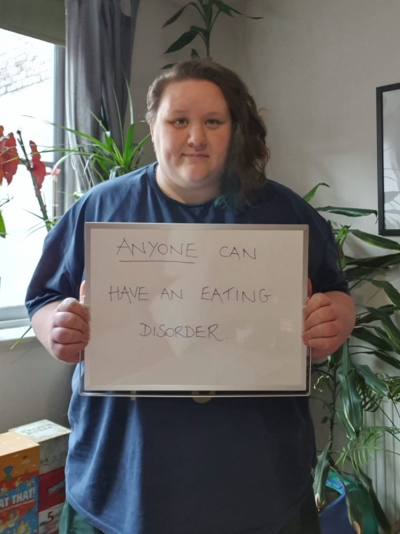
The first Expert by Experience contribution is Ruth’s powerful video ‘A day in the life’:
The second contribution for this week is from EmpowerED Expert by Experience Molly:
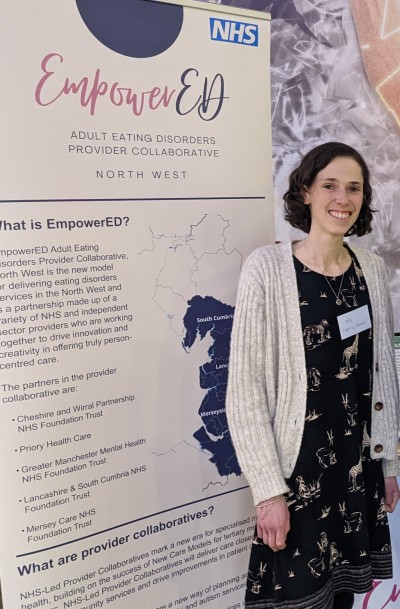
Molly discusses some of the processes that can, for some people, make controlling your eating feel rewarding in an open and honest manner so please be aware that this could be triggering to read if you are experiencing difficulties with your own eating. You may wish to consider reading some of our other Expert by Experience accounts that emphasise other aspects of an eating disorder including the impact of the illness on people’s health and wellbeing.
Anyone can develop an eating disorder. Anyone can have an eating disorder
By EmpowerED Expert by Experience Molly,
Describe an eating disorder. What does it look like? A skeletal frame; frailty; eating nothing at all; selfishness; an obsession with body image…? We all have preconceived ideas about eating disorders.

“My life is going too well to develop an eating disorder”. And outwardly, it was. I could hide behind my achievements. After all, a problem is surely only really a problem once my work is suffering. Success equals happiness and while I’m successful... well, I must be happy enough. I got onto my dream course at my ideal university. However, there was a growing disorder behind this success. I never quite felt I fitted in. An eating disorder begins to emerge, giving me someone to be, an identity and a degree of control. My safety blanket.
“Molly is too sporty”. Too physically fit and strong to develop an eating disorder. My body has a purpose and I enjoy feeling powerful. And I know too that to be strong a body must be fuelled. Without food I cannot be powerful and my performance suffers. The thing is, we can know and believe two very different things. I know I need to eat well; I don’t believe my body will fail. How far can I push it? Exercise becomes another form of abuse for my body.
Then, once you begin disordered behaviour, it becomes an addiction. Politely declining a biscuit as the tray is passed around, becomes who you are and your next high comes in affirming that identity. If you think of yourself as someone who’s a good cook, then a successful dinner party leaves you feeling good. In the same way, I feel a high when I successfully decline food. This is my central identity and I affirm it again and again. Each time it becomes more the core of me until nothing is more important than scoring my next hit; food and resisting it.
I feel safe, strongest, like the best version of me, now my physical form is shrunk, now my mind is singular and focused on one thing. Now there’s rules to contain me in too open a world. I am in control.
It’s hard for people, me included, to see an eating disorder when the person doesn’t fit your preconceptions of ‘a person with an eating disorder’. When they are in its grip but not skeletal, when they are outwardly successful but developed strategies to hide disordered behaviours. I don’t necessarily act like the assumed stereotype – I’ve never shown any interest in fashion, I don’t use social media and am not obsessed with body image; we’re a close family who always ate around the table, together; and I never entirely stop eating.
So, what does an eating disorder look like? … It’s not a dichotomy of course – eating disorder and non-eating disorder. It doesn’t look like any one thing and it refuses to be contained in stereotype. An eating disorder is the perfect strategy for someone like me, like a person you know, who “could never develop an eating disorder”.
“People generally see what they look for, and hear what they listen for” [Harper Lee] Challenge those preconceptions.
The third contribution for this week is from EmpowerED Expert Emma:
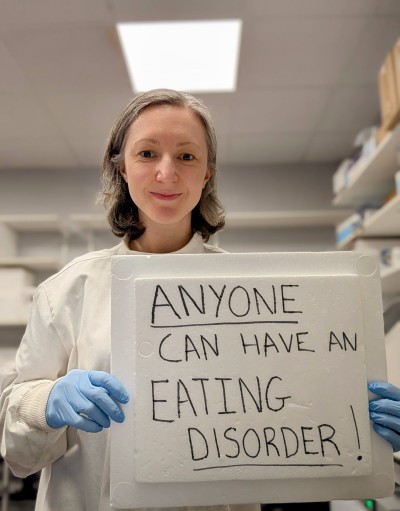
Emma’s article is an open and honest account of her experience with an eating disorder, diagnosis and relapse. This could be triggering to read if you are experiencing difficulties with your own eating and you may wish to consider some of our other Expert by Experience accounts.
Over two decades ago I received a diagnosis that would profoundly shape the rest of my life: an eating disorder.
Despite an early diagnosis by my GP, lack of specialised treatment in my area meant I waited seven years before receiving professional help. This delay caused immense psychological distress for both me and my family, and it put my physical health at serious risk.
How did my diagnosis feel?
Scary. Confusing. Isolating. Yet having my experiences, symptoms, and behaviours collectively labelled as an eating disorder, in my case anorexia, felt overly simplistic. Beneath the surface, there was much more at play. Intrusive thoughts, negative feelings, and difficult emotions stretched far beyond food, hunger, and body image. My internal struggles deprived me of opportunities for comfort, belonging, or acceptance. I was fearful of many things, not just eating, but of my performance at school, college, and university, my relationships with family and friends, and my place in the world. I resorted to restrictive and highly repetitive eating patterns to cope with everyday challenges. I found it impossible to share this experience with anyone. I felt like I did not fit it anywhere or with anyone. I became deeply depressed and withdrawn.
Professional support
Building a trusting relationship with my therapist took months. Initially, I struggled to effectively communicate my thoughts, feelings, emotions, and experiences. I just did not know how or where to start, and I hated having the attention on me. Each session I would arrive terrified, resistant, and reserved. The quality of the relationship that developed between me and my therapist was key to overcoming these challenges. Progress was slow at first, but I felt supported, listened to, and cared for, which gave me hope.
I am pleased to say that the therapy and support I received brought many positive changes to my life. When I left therapy, things were ‘good’—at least compared to the past. I secured a dream job, moved out of the family home, and started my first committed relationship. Although I continued to experience depression and anxiety, I managed to maintain relative stability with food and weight. Surely, this meant I no longer had an eating disorder?
Relapse
Several years later, personal challenges triggered the return of my food-related anxieties, my Achilles’ heel. That deeply ingrained neural pathway was my default coping mechanism. However, this time, the pattern was a little different. I experienced extreme swings between food restriction and binge eating. The more I leaned into one behaviour, the harder and faster I swung to the other, rarely finding a safe middle ground. My body resisted food restriction to the point where any perceived threat of food scarcity compelled me to consume large amounts of food.
These two seemingly opposite behaviours—restricting and bingeing, feeling in and out of control around food—were deeply confusing and frustrating. I was consumed by anger and shame about myself and my actions. I also felt deflated, as I had believed my eating disorder was behind me and struggled to accept that it was still present. Although I kept my struggles a secret from friends and family, I sought professional help. Unfortunately, this time, I did not receive the support I needed. The focus on my behaviours, rather than the underlying psychological and physiological issues, only worsened my condition. Feeling hopeless and alone, I withdrew from the service; despite knowing I desperately needed support.
Present day

By talking about my experiences and listening and learning from others, I continue to learn, grow, and deepen my understanding of myself and my experience of having an eating disorder.
The fourth contribution for this week is from EmpowerED Expert Millie:
“I don’t want to choose You anymore. I want to choose me.”
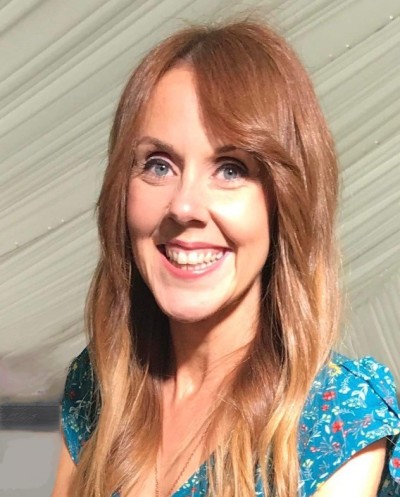
When we first met, I really liked You. I was so happy I’d let You into my life! At a time when I was feeling really low, You swooped in and gave me an escape and we became fast friends. We ignored all the other issues together, You gave me something else to focus on which eased my pain.

People were noticing a difference too – they told me I was looking great! And I was so grateful to You! But I didn’t tell them it was down to You. They wouldn’t understand.
You started off as a friend who checked in a few times a day, but before I knew it, You’d completely committed to me – You just wanted to be with me all the time!
If I was anxious, it didn’t matter! I had You. If I was upset, that was OK! You were there. If I felt fat, You did what You could to make me feel great! And no matter what, You were always there with a plan for me. From the second I woke up to the minute I fell asleep, there You were. In fact, some nights You even appeared in my dreams!
If I ever dared to doubt myself, You were straight back in my ear telling me I was doing the right thing and took the guilt away – what we were doing together was totally normal, exactly how two friends should be when they trust each other. You told me I didn’t need anyone else when I had You, why would I? You got it, they didn’t. So that was ok by me.
But then people started to worry. They found out about You and they didn’t like it. I had to hide You.
I started to back away from seeing other friends, they wouldn’t get ‘it’ like You did. When my family got involved, You got mad. You thought it would be better if they didn’t know how close we were, so we lied to them. I thought it would keep You happy and they’d back off. They warned me about You, but I didn’t want to listen.
And then I started to see a different side to You. You were mean, You spoke to me like dirt. If I spoke up, You told me off. If I questioned You, You shut me down. It was Your way or no way. My feelings didn’t matter.
Sometimes You taunted me and didn’t plan for me, and let me go and do what I wanted and I felt like we were getting somewhere, but when I got back, You made me feel ashamed. And You made me pay for it for days. You punished me, and I started to feel it physically, as well as mentally. Even when I made a promise to leave You behind, You’d appear, uninvited.
I put so much stuff off because You wanted my attention. I tried to ignore You. But I could hear You, and if I couldn’t hear You, I could feel You watching.
I’m starting to see it now, and You’re not who I thought You were. You stop me doing things I want to do. You make me feel ashamed.
Yet, You’re still here. You’re a lot quieter now, maybe You’re starting to feel as tired as I am. Maybe You don’t like that I’m trying to do things my way sometimes. But I don’t like it that You still pull me up and make me question my choices. You’re not really a friend to me.
There are parts of You that I’ll admit, I still care about. But that’s because You’ve been a part of my life for a while now. But who You have become, isn’t someone I want in my life. I know You are still there, You come for me when I’m feeling tired, overwhelmed and especially when I’m anxious, but I’ve got news for You. I’m working on me, and I’m tired of You. And You must be exhausted too. It’s hard to picture a world without You, and I honestly don’t know if I’ll ever be completely rid of You. But for now, I’m working on becoming louder than You.
I don’t want to choose You anymore. I want to choose me.
I’m through with you, You.
Documenting my journey by EmpowerED Expert by Experience Lucy:
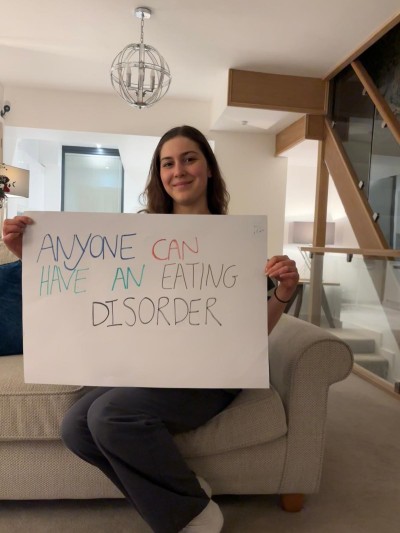
Lucy’s article is an open and honest account of her experience with an eating disorder. This could be triggering to read if you are experiencing difficulties with your own eating and you may wish to consider some of our other Expert by Experience accounts.
I was 16 when I started developing disordered eating habits. I don’t remember an exact point in my life, but eating disorders have many triggers and perpetuating factors, which means often the signs are very subtle at first and can easily be dismissed, which was the case for me, I used to be a competitive swimmer and around the time of my GCSE’s, when I stopped swimming at a high level, I started becoming very aware of calories, nutrition labels and developed strict rules around food. At the same time, I started exercising with the intention of burning calories and very quickly things got out of control.
My intentions initially weren’t about losing weight, it was simply about keeping fit and ‘watching what I ate’ but my diet quickly became very restricted, and I significantly reduced my carbohydrate and sugar intake. During the summer of 2017, I decided to go vegetarian because I saw it as a lower calorie option, but I convinced those around me that I never really liked meat. I also stopped eating dairy because I saw it as an easy way to reduce my calories and I told my family that I was intolerant to it. By the time I was studying A levels, I was going through a whole school day without eating as I knew I would have to eat dinner at home. I was starting to hide food, and I was becoming quite unwell. I remember coming home from school and getting straight into bed because I was always freezing cold, I had headaches and dizzy spells every day and I struggled academically because I was always exhausted. I stopped socialising with friends and always made excuses to avoid social situations because of the involvement of food and the interruption to my routine.
Around this time, I remember seeing a GP with my mum because my periods had not started. I was fully aware that this was due to my eating disorder and excessive exercise but at this point, I saw it as a positive reinforcement each month. My eating disorder had such a tight grip of me that I couldn’t think rationally. I convinced my mum that the reason for my lack of periods was exam stress, and I obviously convinced the GP too because she never screened for an eating disorder or even mentioned it. I’m not saying that she should have known but I do think my presentation warranted a quick screen for an eating disorder with a few questions. I probably would not have been completely honest but by her breaching the topic, it would have then been on my mum’s radar, and it may even have been the nudge I needed to admit I was struggling. I also remember at this appointment that my heart rate and blood pressure were very low, but this was attributed to me being young and athletic.
I will never know how I got through my A levels in the physical and mental state that I was in, but I did, and I started studying medicine in September 2019. I moved over 4 hours away from home and found the transition extremely difficult. Previously I always had dinner at home with my family but now it was all down to me. I was completely in control of what I ate. My brain was constantly thinking about calories and I struggled to concentrate on anything else. During this year, COVID happened and the attention on exercising, fitness tracking and food made everything harder.
Despite how much I was struggling, how unwell I was and how I had changed as a person, no one was aware that I had an eating disorder. I think I must have been very good at hiding it because looking back now all the signs were there. During my early twenties my relationship with my parents and sister became very strained, I was very close to my sister when we were growing up and we spent so much time together but over the years anorexia had stripped me of my personality, and I was not nice to be around anymore. Of course this wasn’t my fault, but no one knew what was going on inside my head. My illness had a huge effect on my family and that’s been one of the most difficult aspects of it for me.
Fast forward to September 2023, I finally told my mum that I needed help. The summer preceding had been so difficult and at this point I think my parents knew there was something wrong, but they thought I was depressed and didn’t enjoy my degree. I remember that morning so clearly and it took so much courage for me to talk to my mum about my eating disorder. At the time, I hated speaking about it and got upset all the time, I had to type out paragraphs on my phone and send them to my mum, boyfriend and close friends because I just couldn’t bring myself to talk. I spent as much of the day as I could in bed, I was so unhappy and cried all the time and I didn’t want to do anything. I had conversations about dropping out of medical school and if it wasn’t for my mum and dad encouraging me to continue with it and waking me up at 5:30 am to get on the bus for placement, I think I would have.
I saw my GP and unfortunately the care, I received was very inadequate. She was reluctant to make a specialist referral because she didn’t think ‘my BMI was low enough’ and she failed to follow guidelines for someone presenting with an eating disorder. Instead, she tried to attribute everything to depression and prescribed me antidepressants. At this point, I was very unwell and was accepted onto NHS services within a couple of weeks for frequent physical health monitoring. It took 18 months for me to be offered any form of cognitive behavioural therapy (CBT) The weekly physical health sessions were awful and I used to dread them, I hated being weighed and would lie to my mum about my weight sometimes. Anorexia turned me into a lying, deceitful and manipulative person and as much as I hated being dishonest, I was so tangled up in the illness that I just couldn’t override it.
I was living at home at this point because If I didn’t have someone making me eat, I wouldn’t. Mealtimes were stressful, tense and sometimes quite traumatic. I had to follow a strict meal plan, and this was so difficult for me. All my food was prepared and served, and I had absolutely no control. For someone who has spent years following strict rules around food, this was torturous.
In April 2023, I had a DEXA scan (bone scan), which I had to request myself. At this point I still didn’t really see myself as unwell despite the abnormalities in my blood profile, and physical health. At a follow up GP appointment, I was told I had osteoporosis. I think retrospectively this probably triggered me to finally start engaging in recovery. For months I had been doing the bare minimum, eating what was in front of me when I had to but still hiding food, lying about food consumption and exercising without telling anyone.
It took a very long time for me to be fully committed to recovery, in fact I would say, summer 2024 was the first time that I really started to want to recover, and I wanted to live my life free of anorexia. I started setting goals, such as going out for coffee and cake, being able to eat tapas on holiday and regularly challenging myself. My last birthday in November and Christmas 2024 were the first times in 8 years where I haven’t dreaded the celebrations. Recovery has not been a linear process, there have been so many ups and downs, setbacks and moments where I questioned if I would ever get through it. I would not be in this position today if it wasn’t for my mum and dads unwavering support and persistent belief that I would get my life back. The tough love approach is brutal, and it really does test a relationship, but it was very much needed. I really hope they know how big a part they played throughout my recovery. My relationship with my sister has also rebuilt since I have recovered, and it fills me with joy that we go shopping and on holidays together and always have a good time. My boyfriend was there for me all through my recovery and I don’t doubt how tough it would have been for him at times. I believe it has made our relationship stronger, and I am lucky to have had him by my side.
I am now physically recovered and am well on my way to being fully recovered. I have reflected a lot recently on how far I’ve come in my recovery from anorexia nervosa and about all the little things in life I can now enjoy, such as a fruit scone, a chocolate bar after dinner and a cup of tea and biscuits in bed in the morning. I now exercise because I genuinely enjoy it. I like feeling strong, I love walking in the mountains for the views and serenity and I really enjoy the social aspect of going to the gym. All of this fills my heart with so much happiness. I’ll always look back on my journey through illness and recovery as one of the toughest chapters of my life, but I’ll be forever proud of myself for getting out of such a dark place. Life is infinitely better now, I’m happy and I’m so excited about my future.
It’s impossible to know what’s going on inside someone’s head by looking at them. Always be kind, don’t make judgements based on misconceptions and stereotypes and remember that the body heals a lot faster than the mind. Someone may appear physically well, but this doesn’t paint the whole picture.
I’ll finish off with a few tips for people suffering with an eating disorder
- Always hold onto hope, Recovery isn’t linear, there will always be setbacks but with hard work, persistence and time you can get there
- Set goals – start with small goals, such as going for lunch with a friend or having snacks at the cinema…. As you work towards these goals focus on self-reflection and consider things that are going well and things to work on.
- Try journalling and writing down your feelings, I did a lot of this throughout my recovery and found it helpful. It’s also nice to look back on the progress you have made.
- Remember you’re not alone, make use of blogs, lived experience groups, podcasts etc
Tips for family/ friends
- Remember eating disorders are not quick fixes and are never fixed overnight.
- Never blame yourself. Eating disorders are multifactorial. Don’t focus on the past but look to the future and hold onto the hope that they will get better
- Be there for them. You don’t have to fully understand but try to empathise.
- If you suspect someone has an eating disorder, asking them in a compassionate way by using phrases such as ‘I’m worried about you….’, ‘I could be wrong but I’ve noticed….’ Or ‘I’m only saying this because I want to help you…’ are far more compassionate and likely to achieve a better outcome than commenting on the way someone looks or behaves.
- If relationships become strained, remember it is only temporary, as the grip of the eating disorder loosens, relationships will return to normal
Tips for HCPs
- If someone comes to you and you suspect an eating disorder, ask the outright if they are struggling with food and have a low threshold for asking these screening questions. Eating disorders thrive in secrecy so by asking the question, it may initiate a conversation
- Avoid stereotyping. Eating disorders can affect anyone.
Advocate for better medical teaching around the topic of eating disorders
The final piece for the week is a poem written by EmpowerED Expert Tanaisha:
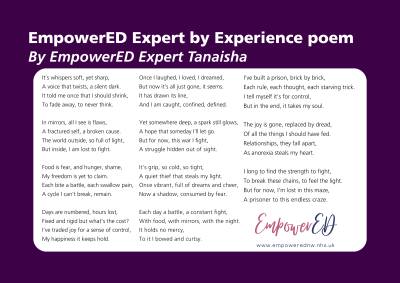
EmpowerED Expert by Experience poem
By EmpowerED Expert Tanaisha
It’s whispers soft, yet sharp,
A voice that twists, a silent dark.
It told me once that I should shrink,
To fade away, to never think.
In mirrors, all I see is flaws,
A fractured self, a broken cause.
The world outside, so full of light,
But inside, I am lost to fight.
Food is fear, and hunger, shame,
My freedom is yet to claim.
Each bite a battle, each swallow pain,
A cycle I can’t break, remain.
Days are numbered, hours lost,
Fixed and rigid but what’s the cost?
I’ve traded joy for a sense of control,
My happiness it keeps hold.
Once I laughed, I loved, I dreamed,
But now it’s all just gone, it seems.
It has drawn its line,
And I am caught, confined, defined.
Yet somewhere deep, a spark still glows,
A hope that someday I’ll let go.
But for now, this war I fight,
A struggle hidden out of sight.
It’s grip, so cold, so tight,
A quiet thief that steals my light.
Once vibrant, full of dreams and cheer,
Now a shadow, consumed by fear.
Each day a battle, a constant fight,
With food, with mirrors, with the night.
It holds no mercy,
To it I bowed and curtsy.
I’ve built a prison, brick by brick,
Each rule, each thought, each starving trick.
I tell myself it’s for control,
But in the end, it takes my soul.
The joy is gone, replaced by dread,
Of all the things I should have fed.
Relationships, they fall apart,
As anorexia steals my heart.
I long to find the strength to fight,
To break these chains, to feel the light.
But for now, I’m lost in this maze,
A prisoner to this endless craze.
Eating Disorders animation from Mersey Care NHS Foundation Trust
Spotting the signs of an Eating Disorder can be difficult. Watch the Mersey Care animation to learn what to look out for and how to support a loved one:
For more information about Mersey Care NHS Foundation Trust Eating Disorder services please visit their website.
